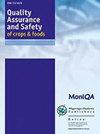蜡样芽孢杆菌XZ30-2对黑曲霉的抑菌机理及生防效果
IF 5.3
3区 农林科学
Q1 FOOD SCIENCE & TECHNOLOGY
引用次数: 1
摘要
黑曲霉是引起谷物、水果和蔬菜变质的主要霉菌。控制储粮中的霉菌对食品安全至关重要。目前,应用微生物防治黑曲霉是一种较为安全有效的方法。本研究分离到一株抗黑曲霉的菌株XZ30-2,根据其形态和生化特征,以及16个Svedberg核糖体核糖核酸(16S rRNA)基因序列分析,鉴定为蜡样芽孢杆菌。作用机制研究表明,XZ30-2培养滤液使黑曲霉菌丝膨胀或收缩,增加膜通透性,导致胞内渗漏和核酸释放,破坏质子泵,降低麦角甾醇含量,诱导膜脂过氧化和活性氧(ROS)积累。此外,蜡样芽孢杆菌XZ30-2培养滤液可产生水解酶和脂肽,包括iturin、surfactin和fengycin。本研究还评价了XZ30-2对小麦黑穗病的防治效果,结果表明,40 μL/g培养滤液对黑穗病的防治效果显著。因此,蜡样芽孢杆菌XZ30-2可作为防治储粮中黑曲霉的生物制剂。本文章由计算机程序翻译,如有差异,请以英文原文为准。
Antimicrobial mechanism and biocontrol effect of Bacillus cereus XZ30-2 on Aspergillus niger
Aspergillus niger is a major mold-causing spoilage in cereals, fruits and vegetables. Controlling of mold in stored grains is essential for safety of food. Currently, application of microorganisms to control A. niger is a safer and more effective method. In this study, strain XZ30-2 against A. niger was isolated and identified as Bacillus cereus according to morphological and biochemical characteristics as well as 16 Svedberg ribosomal ribonucleic acid (16S rRNA) gene sequence analysis. The investigation of action mechanism showed XZ30-2 culture filtrate caused the mycelia inflated or contract, increasing the membrane permeability, leading to the intracellular leakage and nucleic acids release, disrupting the proton pump, decreasing the ergosterol content, inducing the membrane lipid peroxidation and reactive oxygen species (ROS) accumulation in A. niger. Moreover, B. cereus XZ30-2 culture filtrate could produce hydrolases and lipopeptides, including iturin, surfactin and fengycin. This work also evaluated the control effect of XZ30-2 on A. niger in wheat grains, and indicated that 40 μL/g of culture filtrate significantly controlled the infection of A. niger. Therefore, B. cereus XZ30-2 can be developed as a biological agent for controlling A. niger in stored grains.
求助全文
通过发布文献求助,成功后即可免费获取论文全文。
去求助
来源期刊

Quality Assurance and Safety of Crops & Foods
FOOD SCIENCE & TECHNOLOGY-
CiteScore
4.60
自引率
7.50%
发文量
61
审稿时长
1 months
期刊介绍:
''Quality Assurance and Safety of Crops & Foods'' is an international peer-reviewed journal publishing research and review papers associated with the quality and safety of food and food sources including cereals, grains, oilseeds, fruits, root crops and animal sources. It targets both primary materials and their conversion to human foods. There is a strong focus on the development and application of new analytical tools and their potential for quality assessment, assurance, control and safety. The scope includes issues of risk assessment, traceability, authenticity, food security and socio-economic impacts. Manuscripts presenting novel data and information that are likely to significantly contribute to scientific knowledge in areas of food quality and safety will be considered.
''Quality Assurance and Safety of Crops & Foods'' provides a forum for all those working in the specialist field of food quality and safety to report on the progress and outcomes of their research.
 求助内容:
求助内容: 应助结果提醒方式:
应助结果提醒方式:


